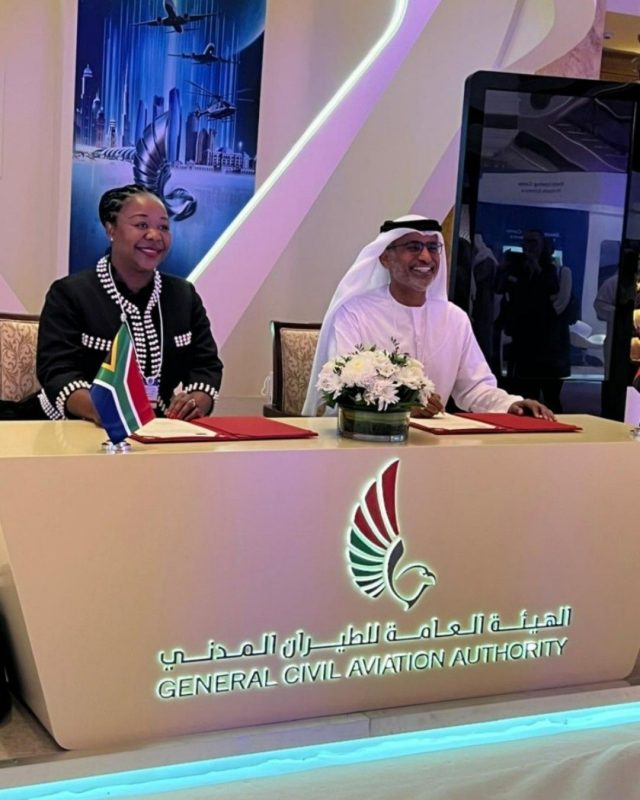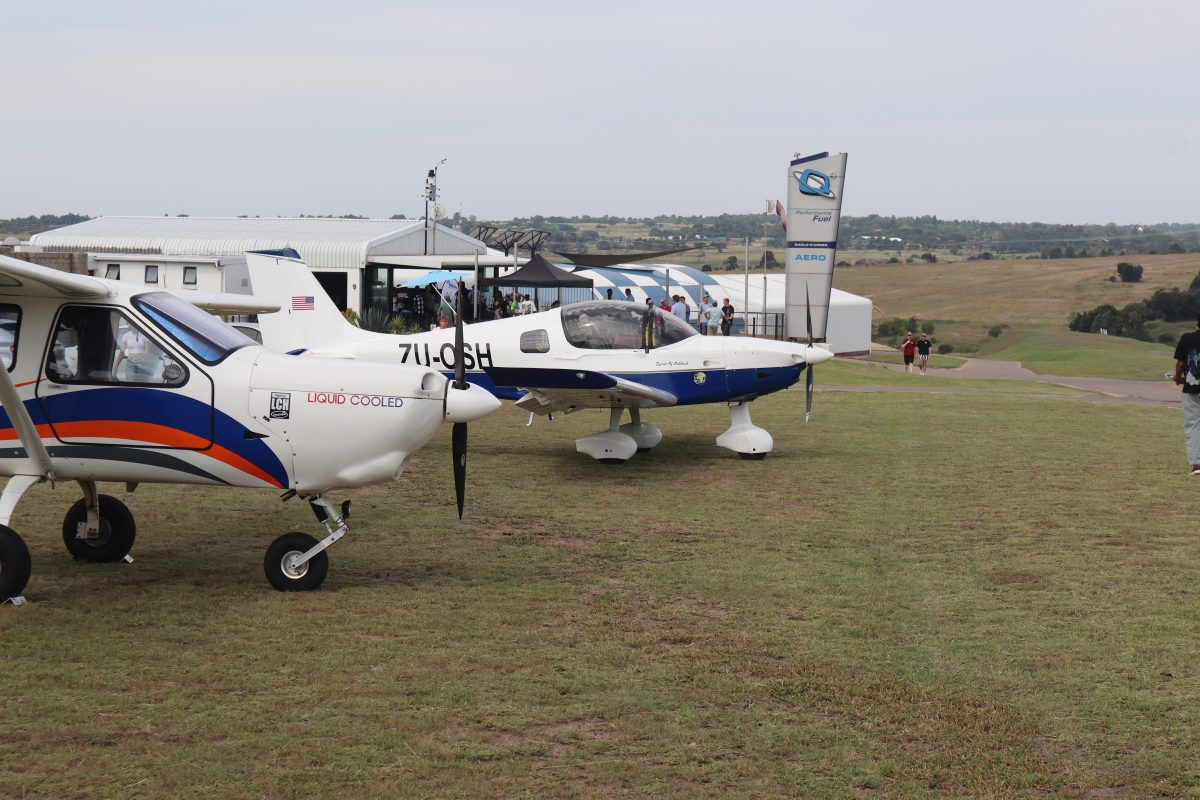Johannesburg, South Africa: On 12 February 2025, South Africa and the United Arab Emirates (UAE) signed a new Memorandum of Understanding (MoU) on Air Services, further strengthening aviation ties between the two nations. This was the culmination of deliberations between Ms Poppy Khoza, Director of the South African Civil Aviation Authority (SACAA) and her UAE counterpart H.E. Saif Mohammed Al Suwaidi who were present at the signing ceremony in Dubai. This and previous MoUs align with the Chicago Convention (1944), which set out a framework for bilateral airline operations, market access, regulatory alignment, and economic cooperation. The content of the MoU is unknown at the moment, save that the SACAA has indicated that it generally focuses on technical matters, including safety, security, training and environmental initiatives.
Given the current South African aviation landscape, marked by challenges such as economic recovery post the Covid-19 pandemic and a fledgeling national airline trying to recover from business rescue, restructuring of key airlines, and the drive for increased international connectivity, this agreement is timely and strategic. Not only does it facilitate air transport between the two countries, it also enhances trade, tourism, and investment opportunities.
What are the key provisions in this kind of MoUs?
Designation of Airlines and Market Access
It is a norm for states concluding such bilateral agreements to negotiate for market access for their designated airline. Thus each state designates one or more airlines to operate air services between their respective territories. In aviation, designated airline means an airline that has been officially selected by a contracting state to operate international air services on its behalf. In such circumstances, the contracting states: (i) may establish a presence in the other country for ticket sales, marketing, and promotional activities, and (ii) may require the submission of the timetable of one country’s designated airline to the other, at least 30 days in advance for approval, specifying flight frequency, aircraft type, configuration, and seating capacity. Any changes would require further approval.
Such a provision is aimed at enhancing commercial flexibility, allowing airlines to operate with greater predictability and market access. South African airlines, particularly those with ambitions for Middle Eastern expansion, stand to benefit significantly. Such agreements also promote fair competition by ensuring reciprocal opportunities for UAE airlines in South Africa.

Mutual Recognition of Licenses and Personnel Certifications
It is also a norm for agreements of this nature to operationalise the mutual recognition of personnel licenses issued by the respective aviation authorities, facilitating the movement of pilots, engineers, and cabin crew between jurisdictions. To this end, licences, certificates of airworthiness and certificates of competency issued or rendered valid by one state and still in force are then recognised by the other as valid. Critically, such provisions allow for deviations from the norm in licencing, and stipulate that licences or certificates issued with such a deviation shall be regarded as valid provided that such deviation was lodged with the International Civil Aviation Organisation.
Customs and Duties Exemptions
Exemption of specific goods and services usually forms part of such agreements – where the focus is to exempt certain goods and stores from customs duties when carried on board aircraft for onboard consumption, provided they remain on board until re-exported. This aligns with international aviation norms, ensuring that operating costs are reduced for designated airlines. The spinoff of this is that it could lower ticket prices and enhance service offerings, making flights between the two countries more competitive.
Regulation of Service and Airport Charges
Another key component of bilateral air service agreements is the regulation of airport, service and facility charges. Usually these agreements contain provisions which stipulate that neither country can levy higher charges on the designated airline of the other than those imposed on its own airlines using similar equipment.
This provision ensures non-discriminatory pricing and supports fair competition. For South African carriers, this is particularly beneficial as it guarantees cost parity with UAE airlines, promoting route sustainability and profitability.
Foreign Exchange and Currency Transactions
Designated airlines are allowed to sell air transport in local currency or freely convertible currencies. Given that both South Africa and the UAE are members of BRICS, this provision means that once the BRICS currency is adopted and operational, each party could choose to sell their services using the BRICS currency rather than the American dollar. It is not clear, however, if such a provision envisages the use of crypto currency.
Security and International Law Compliance
It is common for parties to a bilateral air services agreement to reiterate their fidelity to international criminal law and international aviation law – pledging to enforce treaties that punish crimes against civil aviation. This reflects a strong commitment to safety and security, ensuring that flights remain compliant with global counterterrorism and aviation security protocols.
What are the Strategic Implications for South Africa’s Aviation Sector post the agreement?
Boosting Economic Growth and Trade Relations
It is common cause that the UAE is one of South Africa’s top trading partners, recording a resounding 40% in growth in trade between the two states in the period 2020 to 2023. Thus, enhanced air connectivity will streamline cargo movement, supporting exports of minerals, agricultural products, and manufactured goods. Additionally, South African businesses will gain better access to Middle Eastern markets, particularly in luxury goods, agribusiness, and technology.
Strengthening South Africa’s Airlines and Aviation Infrastructure
Such agreements present opportunities for South African airlines (designated airlines) to expand their international footprint. It may spur infrastructure investment, as South African airports (Johannesburg, Cape Town, Durban) prepare for increased traffic from the UAE. Further, designated South African carriers could prepare to service destinations such as Abu Dhabi, Dubai and Sharjah.
Enhancing South Africa’s Role in the BRICS Aviation Strategy
The flexibility in currency usage aligns with South Africa’s BRICS
economic policies, promoting trade independence from Western financial institutions. Trade in local currencies allows economies of the global south to reduce reliance on the US dollar. Further, improved connectivity with the UAE could position South Africa as a hub for BRICS aviation and a key player in Africa-Middle East trade routes.
Tourism and Cultural Exchange Benefits
UAE travellers are among the highest-spending tourists globally. Agreements on new destinations translate to more accessible flights, which could boost South Africa’s tourism sector, particularly luxury and eco-tourism. Equally, South Africans also stand to benefit from better access to Dubai, Abu Dhabi, and Sharjah, hubs for business, leisure, and religious travel (Hajj and Umrah pilgrimages).
Conclusion: A Step Toward a Stronger Aviation Future
The February 2025 South Africa-UAE MoU is a pivotal agreement, reinforcing economic, aviation, and diplomatic ties. It adds to a balanced regulatory framework, ensuring fair competition, financial flexibility, and enhanced connectivity.
For South Africa’s aviation sector, such bilateral agreements represent a gateway to the Middle East, promising new routes, economic opportunities, and job creation. As implementation progresses, stakeholders—including airlines, regulators, and industry players—must capitalize on these provisions to ensure sustained benefits for the South African economy and air transport sector.
Prof Angelo Dube


